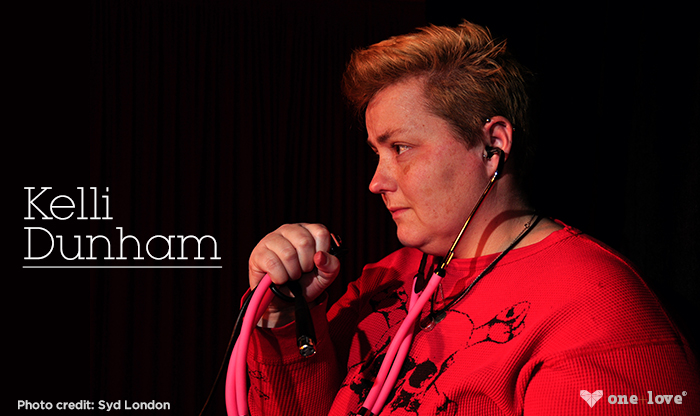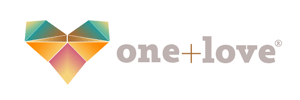
Kelli Dunham, “Everyone’s Favorite Ex-Nun, Genderqueer, Nerd Comic”
An ex-nun, genderqueer, nerd comic walk into a bar — and…wait for it…it’s Kelli Dunham! Kelli performs “progressive comedy” in bars, among other places, and even landed on the Campus Pride HOTLIST for being a popular performer on the LGBTQ college circuit. (Plot twist: Kelli’s latest book, Freak of Nurture, may or may not reveal why Kelli carried this sign in the Dyke March: “I taught a nun to masturbate.”) But wait, there’s more: Kelli is a bachelor’s prepared registered nurse and offers the workshop, “A Casserole Is Not Enough: Building Teams of Care in Non-Traditional Communities.” Why not make some humor lemonade out of life’s sour? Kelli shows us how.
What are some of the barriers to creating vibrant communities of care for and within “non-traditional communities”?
There are external factors: we’re often traumatized, broke, and working as many jobs as we can to get by. But when I do this workshop where I talk about bringing in your primary circle (followed by secondary circle, etc) folks often say, “None of my primary people, my heart people, live in my area.” So that’s part of queer mobility, which is sometimes inevitable and sometimes comes out of our misunderstanding existential loneliness or [desire] to be where all the cool kids are — which is something, as a community, we have to outgrow.
We call each other “chosen family” but then do we get together for Sunday dinners? Do we spend the kind of time that it takes to to be vulnerable? Do we make sure that even the really annoying people are taken care of?
And it’s hard to ask for help. For many reasons. But it’s actually the responsible thing to do. Not asking for help when you need it actually really hurts friendships; I’ve learned this the very hard way.
Also important is the flip side: showing the hell up when people in our communities need us. Not saying “I’m too busy” or “I’m too fragile” or some other manifestation of queer flakiness. I mean, when I talk with folks who have a friend with cancer — someone who is really sick and needs their close people by them — and I hear an intimate friend say, “Well, I had a bad experience in a hospital,” it makes me hopping hopping hopping mad. Of course you’ve had a bad experience at the hospital — it’s a frickin hospital, that’s what kind of experiences people have there! With the possible exception of gender confirmation surgeries and childbirth, pretty much hospitals are full of people having the worst days of their lives.
Now if you’re not close with the person in the hospital, and hospitals are button-pushing for you, yeah, let’s use the smart team approach and help your friend out when they come home from the hospital. But if you’re their inner circle and they need YOU? That’s the time to figure out who can help YOU to pull it together so you can be there for your friend.
Got some of inspiring examples of communities of care that you’ve witnessed/heard about/experienced?
I know I just railed about folks not showing up, and I’ve witnessed that, but overwhelmingly that’s not been my personal experience at all. I have had two partners who have died of cancer and people showed up absolutely heroically for both of them in many, many cases. Heather MacAllister had this international email list of what she called her “Love Troopers” that sustained her through a pretty long illness. My partner Cheryl also had a great group of New York artists and queers who came through for her and for us; she was hospitalized for almost three months and I was able to stay with her every single night because folks took care of everything else for me. It was really nothing short of a miracle. When people talk about “flaky” artists, writers, creative people, etc, I think, “Are you kidding me?” A lot of those same folks came through for me, also EXTREMELY generously, when I had a knee replacement and then major complications earlier this year.
I’ve seen an example in a small midwestern U.S. town of a community member who experienced a sexual assault and slid into a yearlong depression and folks rallied around her. She talked about folks cutting her sandwiches into four pieces for her because eating felt so overwhelming otherwise. My co-worker’s partner had a bone marrow transplant — a very long process — and her queer community of faith brought meals for months.
The team approach really works, or at least works better than one person trying to do everything. I think we’ve got a long way to go in terms of care for folks in long-term situations. I’m thinking of an acquaintance with chronic Lyme disease who said it’s always other folks with chronic Lyme disease who are trying to help and support each other, and they’re all often sick as hell and tired as hell.
As a stand-up comic, what connections do you see between humor and strengthening LGBTQ care networks and healthcare?
I was thinking of this last month when I did a workshop at Philly Trans Health Conference called “Why Isn’t My Body Speaking to Me: Building A Relationship with Our Past/Present Physical Selves.” Almost 30 people came even though it was at 8:45 a.m. on the third day of the conference. It’s a difficult workshop about trying to make peace with the damage we’ve done to our bodies in order to survive. That people come at all seems heroic; 8:45 a.m. seems miraculous.
But as we were all talking and sharing and laughing really hard, I realized that the kind of conversations we need to have about our disconnection to our bodies, how hard we have to fight to get healthcare — all that can only happen if we’re laughing too. It’s too overwhelming otherwise.
Got anything to share about what’s new or interesting or odd or funny about the world of LGBTQ comedy?
I did a show called “Don’t Come to This Show” with three performers I really like and admire: Jes Tom, Red Durkin, and J Mase III. The whole premise of the show was that we were going to be talking about challenging shit, and we worked some major reverse psychology with our marketing — we made about 100 jpegs with reasons not to come to the show. It worked. We packed the Bowery Poetry Club at 3:30 on a Sunday afternoon. There was even a straight cis couple there, tourists from Scotland. Not my usual crowd for sure. But people want to be challenged. Even in comedy, people WANT it. I talk about death and cancer and childhood abuse in my comedy. And what was so valuable for me — I was even being challenged as I was sitting in the audience. Some of the material J Mase III (who is a poet, but he is also quite funny) performed was about the messed up things that white people who are supposed allies do. It made me think, ”Oh, shit, I do that — how can I act differently?” And Red Durkin? Do you want someone to challenge the way masculine people treat women, especially trans women? Yeah, Red does that for me every time she performs! It’s pretty deep “ha ha ha ha, oh shit, I do that!” And then hopefully the next step is let me stop doing that.
Anything else you want to talk about?
I also write children’s books. I wrote The Boy’s Body Book and The Girl’s Body Book (so binary, I know, but it’s about puberty) and The Boy’s Body Book is the bestselling book in its category by far. And while I wish they included more, hmmm, non-binary info, I’m proud of what I was able to sneak in.
I’m setting up a tour for my book, Freak of Nurture. It came out last year but then my knee exploded and I had to address that. So my fall tour is going to be called “Freak of Nurture: Comedy and Casseroles” and I want to do a comedy show one night and my workshop on caregiving (hence, the casseroles) the next night — kind of as a bonus. So colleges, community centers, LGBT faith communities, livestock auctions, get in touch! Plus I will cook casseroles for you. And I’m a midwestern farm boi — I know how to do casseroles.
Find Kelli on Facebook, Tumblr, YouTube, and on Kelli’s website. Follow on Twitter: @kellidunham

Recent Comments